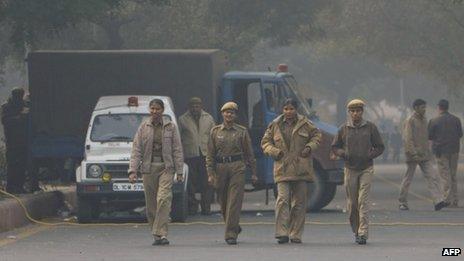Gang rape sparks India media debate
- Published

Police have been deployed to deal with the protests
The gang rape of a student on a bus in the Indian capital Delhi and the subsequent street protests have prompted widespread media coverage as well as soul-searching among editorial writers.
While some protesters demand the death penalty for the attackers and some politicians have called for reform, a number of writers urge restraint, saying that existing laws are adequate but that their proper implementation is at fault.
Some commentators encourage the authorities to heed the concerns of protesters - who have brought parts of the capital to a standstill - and also to ensure that the police handle them in a "civilised" way.
Editorial in The Indian Express
Even as they vent their frustration, they have been essentially seeking assistance in articulating what it is that they demand when they seek a safer environment to go about their daily lives. In the absence of such guidance, the protests, amplified and primed up hysterically by the electronic media, are in danger of becoming even more driven by bloodlust. Justice is qualitatively different from vengeance.
Editorial in The Hindu
Instead of pushing the national debate in the direction of serious systemic reform, especially of law enforcement and justice delivery, a number of opposition politicians have started an irresponsible debate on the need for the death penalty, or castration of rapists. These demands, which have had a populist echo amongst the protesters at India Gate, ignore the fact that shoddy investigation, poor forensics and misogynist attitudes among the police and even lower judiciary are the main reasons why rape victims in India do not get justice.
Editorial in The Times of India
In the face of emotive calls for the death penalty for rapists, we must remain focussed on durable, long-term solutions.
Shiv Vishwanathan in The Asian Age
Yet, as tempers mellow, one has to ask more serious questions. What will the administration do?... If it understands politics, it should see these protests as warning signs and respond to them. Unfortunately, the administration is indifferent to rape and the citizen keeps protesting futilely, waiting for a miracle.
Editorial in Navbharat Times
Why are the weaker sections of the society not participating in these protests? Especially, why have those, who live in the slums where the main accused of this gang rape lives, come forward? Indian society is divided and everyone is fighting their own battle. There is no dialogue between the various groups… Displaying anger is one thing, but those who want to change the system must think about it.
Editorial in Nai Dunya
Since no law can be made overnight and the due process has to be followed, the protesting students must end their protest demonstrating patience and rationale and wait for the government's next move. On the other hand, the government must tell the police to deal with such emotional protests in a humanitarian and civilised way.
BBC Monitoring, external reports and analyses news from TV, radio, web and print media around the world. For more reports from BBC Monitoring, click here. You can follow BBC Monitoring on Twitter, external and Facebook, external.
- Published24 December 2012
- Published24 December 2012
- Published24 December 2012